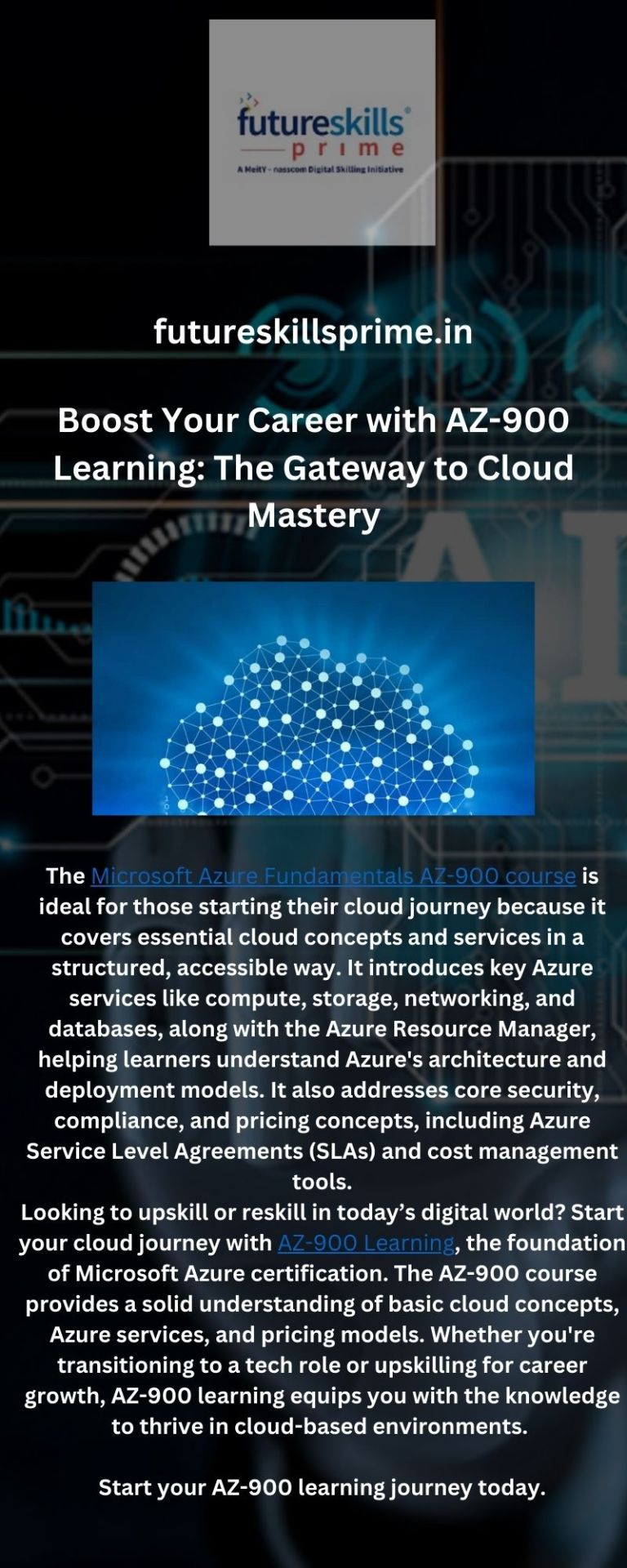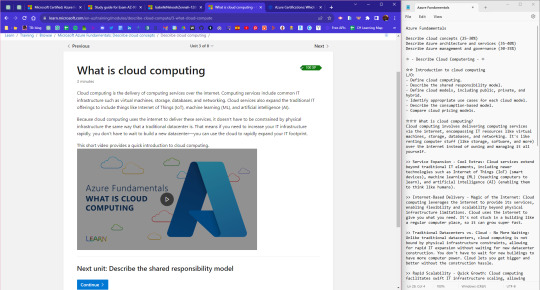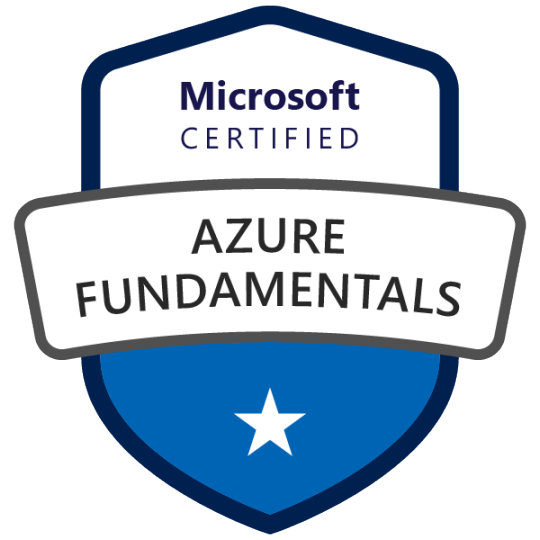#Microsoft Azure Fundamentals
Explore tagged Tumblr posts
Text
#azure data engineer#azure course#azure training#azure online training#azure certification#microsoft azure certification#azure certification path#azure fundamentals#azure devops certification#azure cloud certification#microsoft azure fundamentals
1 note
·
View note
Text

"Nevermind I am an idiot."
#as you can see chen is liveblogging my absolute hell that is the microsoft azure fundamentals exam prep#I KNOW NOTHING WHAT THE FUCK#i'm gonna cri
4 notes
·
View notes
Text
Microsoft Azure Data Fundamentals [Exam DP-900] Full Course
Exam DP-900: Microsoft Azure Data Fundamentals can be used to prepare for other Azure role-based certifications like Azure … source
0 notes
Text
AZ-900: Microsoft Azure Fundamentals
Start your cloud journey with AZ-900: Microsoft Azure Fundamentals. Gain essential Azure skills and certifications with this beginner-friendly course.
0 notes
Text
Today is day, one of studying for the Microsoft Azure, AI fundamentals and my plan of attack us slowly, but surely go through the material and then take the test.
0 notes
Text
Microsoft Azure Fundamentals (AZ-900): The Essential Certification for Cloud Beginners
As cloud computing transforms how organizations operate, businesses need skilled professionals to manage and optimize these digital infrastructures. Microsoft Azure is one of the leading cloud platforms globally, and understanding its foundational elements is a valuable skill for anyone entering the IT field. The Microsoft Azure Fundamentals (AZ-900) certification is designed for beginners to grasp the core principles of Azure services, making it an ideal starting point for those interested in cloud computing careers. In this article, we’ll explore what the AZ-900 certification entails, its benefits, and how to prepare for it.
What is the Microsoft Azure Fundamentals (AZ-900) Certification?
The AZ-900 certification is a beginner-level credential provided by Microsoft to validate foundational knowledge of cloud services and how those services are implemented in Microsoft Azure. Unlike other cloud certifications, AZ-900 is intended for individuals with no prior cloud computing experience. It covers the basic concepts of Azure services, pricing models, cloud principles, and security, making it accessible for students, entry-level IT professionals, and even non-technical roles in sales, marketing, or project management.
The certification exam includes 30-40 questions in multiple-choice and drag-and-drop formats. Candidates have 60 minutes to complete the exam, which covers topics such as:
Cloud Concepts: Understanding cloud computing, its benefits, types of cloud models (public, private, and hybrid), and cloud service types (IaaS, PaaS, SaaS).
Core Azure Services: Familiarizing oneself with key Azure services such as compute, networking, storage, and databases.
Security, Privacy, Compliance, and Trust: Learning about Azure’s security tools, network security, compliance offerings, and identity services.
Azure Pricing and Support: Understanding the Azure cost management options, service-level agreements (SLAs), and support plans.
The AZ-900 exam provides a broad overview, rather than focusing deeply on any specific technology. It serves as a stepping stone to more advanced certifications, such as Azure Administrator (AZ-104) or Azure Developer (AZ-204).

Why Pursue the AZ-900 Certification?
Several factors make the AZ-900 certification an excellent investment for professionals new to cloud computing and Microsoft Azure. Here are some of the key benefits:
1. An Entry Point to Cloud Computing
AZ-900 is perfect for individuals with little or no experience in cloud computing. It doesn’t require advanced technical skills, making it accessible to a wide audience. For those looking to switch careers, this certification provides an easy on-ramp to the cloud industry and helps build a foundational understanding without overwhelming technical details.
2. Broad Understanding of Azure
The certification provides an overview of Microsoft Azure’s architecture, services, and capabilities. It offers insights into how organizations use the cloud, such as by leveraging resources on-demand, automating operations, or scaling to meet user needs. Understanding these concepts is invaluable for working effectively with or within IT teams, even if you’re not in a technical role.
3. Career Advancement Opportunities
With cloud computing continuing to grow rapidly, professionals with cloud knowledge are in high demand. Earning the AZ-900 certification not only adds value to your resume but also demonstrates to employers that you’re serious about learning cloud concepts. Additionally, as organizations increasingly migrate to the cloud, professionals with basic Azure knowledge will be well-positioned to contribute to these projects.
4. Foundation for Advanced Azure Certifications
If you’re aiming for a more technical role, such as Azure Administrator, Developer, or Solutions Architect, AZ-900 provides the foundation to pursue these more specialized certifications. Building your knowledge in stages can make the process less overwhelming, as you’ll already have a handle on Azure’s basic principles.
5. Confidence with Cloud-Based Solutions
AZ-900 certification can boost confidence when discussing cloud-based solutions with colleagues or clients. This certification equips you to understand the cloud’s role in digital transformation, making it easier to participate in or manage cloud-related projects within your organization.
Preparing for the AZ-900 Certification
While AZ-900 is an entry-level certification, preparing effectively is key to passing the exam. Here are some strategies and resources to help you succeed:
1. Review Microsoft’s Learning Paths
Microsoft offers free online learning paths for AZ-900, covering each exam objective in detail. These modules provide interactive exercises, videos, and summaries, making it easier to understand complex topics. Starting with these learning paths ensures you have a well-rounded foundation in each area covered by the exam.
2. Explore Azure Free Account
One of the best ways to learn is through hands-on experience. Microsoft offers a free Azure account that includes $200 in credits for the first 30 days and limited free access to certain services for 12 months. Using the platform directly allows you to experiment with virtual machines, storage, databases, and other Azure services. Practical experience not only enhances understanding but also reinforces what you learn in theory.
3. Use Practice Exams
Practice exams are helpful for getting familiar with the exam format and identifying areas for improvement. Sites like MeasureUp and Whizlabs offer AZ-900 practice exams that simulate the real test. Reviewing questions and answers after completing these exams helps reinforce concepts and pinpoint areas where you may need additional review.
4. Attend Microsoft Azure Virtual Training Days
Microsoft frequently hosts free, one-day training sessions called Azure Virtual Training Days. These sessions are led by certified Azure instructors and provide an in-depth overview of Azure fundamentals. Attendees also receive a voucher to take the AZ-900 exam for free, making this an excellent option for those who want to save on certification costs.
5. Consider Video Courses on Platforms Like Udemy or LinkedIn Learning
For more structured learning, consider enrolling in a video course. Courses from platforms like Udemy, LinkedIn Learning, or Pluralsight can provide guided lessons, quizzes, and resources to help you pass the AZ-900 exam.
Conclusion
The Microsoft Azure Fundamentals (AZ-900) certification is an excellent starting point for those interested in cloud computing or looking to enhance their understanding of Microsoft Azure. By covering core cloud concepts, Azure services, security, and pricing, the certification equips professionals with a foundational knowledge of how Azure works. For career switchers, entry-level IT professionals, and non-technical roles alike, AZ-900 offers a pathway to cloud proficiency and a gateway to further career opportunities in the digital world.
As cloud technology continues to shape business landscapes, understanding Azure’s basics will only become more valuable. With accessible study resources, hands-on experience options, and ample exam prep tools, pursuing the AZ-900 certification is a manageable and rewarding way to start your cloud journey. Whether as a stepping stone to more advanced certifications or as a standalone credential, AZ-900 can give you a significant edge in today’s tech-driven job market.
0 notes
Text
Microsoft Azure for Beginners: Your 2025 Guide to Cloud Mastery
youtube
0 notes
Text

Boost Your Career with AZ-900 Learning: The Gateway to Cloud Mastery
The Microsoft Azure Fundamentals AZ-900 course is ideal for those starting their cloud journey because it covers essential cloud concepts and services in a structured, accessible way. It introduces key Azure services like compute, storage, networking, and databases, along with the Azure Resource Manager, helping learners understand Azure's architecture and deployment models. It also addresses core security, compliance, and pricing concepts, including Azure Service Level Agreements (SLAs) and cost management tools.
1 note
·
View note
Text
0 notes
Note
Can I ask you questions about the cloud and the azure exam?
Sure! I did it today. 😊
I participated of a Microsoft initiative for women with a lot of classes regarding AZ-900 and one day earlier I watched this exam cram video that also helped a lot - highly recommend 😊🤓
#ask response#anon ask#studyblr#study#az900#microsoft azure#certification#study blog#study motivation#studying
6 notes
·
View notes
Text
Microsoft Azure Fundamentals

Thursday 17th august 2023
Dad has got me trying to get the Microsoft Azure Fundamentals certification! If you know me, I love my name on certificates so I am trying it out! I haven't been too much into cloud computing so I guess this is a good opportunity to actually learn and see what it's all about.
I know the bare basics that it's storing things not at the company?? Like at work, they store everything in Azure. Again, I may be wrong with the definition - that's why I'm learning!
Learning new things can be fun! ˙˚ʚ(´◡`)ɞ˚˙
#xc: studies#azure studies#codeblr#coding#progblr#programming#studyblr#studying#computer science#microsoft azure#azure certification#tech#cloud computing
31 notes
·
View notes
Text
Exploring DeepSeek and the Best AI Certifications to Boost Your Career
Understanding DeepSeek: A Rising AI Powerhouse
DeepSeek is an emerging player in the artificial intelligence (AI) landscape, specializing in large language models (LLMs) and cutting-edge AI research. As a significant competitor to OpenAI, Google DeepMind, and Anthropic, DeepSeek is pushing the boundaries of AI by developing powerful models tailored for natural language processing, generative AI, and real-world business applications.
With the AI revolution reshaping industries, professionals and students alike must stay ahead by acquiring recognized certifications that validate their skills and knowledge in AI, machine learning, and data science.
Why AI Certifications Matter
AI certifications offer several advantages, such as:
Enhanced Career Opportunities: Certifications validate your expertise and make you more attractive to employers.
Skill Development: Structured courses ensure you gain hands-on experience with AI tools and frameworks.
Higher Salary Potential: AI professionals with recognized certifications often command higher salaries than non-certified peers.
Networking Opportunities: Many AI certification programs connect you with industry experts and like-minded professionals.
Top AI Certifications to Consider
If you are looking to break into AI or upskill, consider the following AI certifications:
1. AICerts – AI Certification Authority
AICerts is a recognized certification body specializing in AI, machine learning, and data science.
It offers industry-recognized credentials that validate your AI proficiency.
Suitable for both beginners and advanced professionals.
2. Google Professional Machine Learning Engineer
Offered by Google Cloud, this certification demonstrates expertise in designing, building, and productionizing machine learning models.
Best for those who work with TensorFlow and Google Cloud AI tools.
3. IBM AI Engineering Professional Certificate
Covers deep learning, machine learning, and AI concepts.
Hands-on projects with TensorFlow, PyTorch, and SciKit-Learn.
4. Microsoft Certified: Azure AI Engineer Associate
Designed for professionals using Azure AI services to develop AI solutions.
Covers cognitive services, machine learning models, and NLP applications.
5. DeepLearning.AI TensorFlow Developer Certificate
Best for those looking to specialize in TensorFlow-based AI development.
Ideal for deep learning practitioners.
6. AWS Certified Machine Learning – Specialty
Focuses on AI and ML applications in AWS environments.
Includes model tuning, data engineering, and deep learning concepts.
7. MIT Professional Certificate in Machine Learning & Artificial Intelligence
A rigorous program by MIT covering AI fundamentals, neural networks, and deep learning.
Ideal for professionals aiming for academic and research-based AI careers.
Choosing the Right AI Certification
Selecting the right certification depends on your career goals, experience level, and preferred AI ecosystem (Google Cloud, AWS, or Azure). If you are a beginner, starting with AICerts, IBM, or DeepLearning.AI is recommended. For professionals looking for specialization, cloud-based AI certifications like Google, AWS, or Microsoft are ideal.
With AI shaping the future, staying certified and skilled will give you a competitive edge in the job market. Invest in your learning today and take your AI career to the next leve
3 notes
·
View notes
Text
Another exam passed!

I've scored myself Microsoft's Azure Fundamentals (AZ-900) certification, and now I have a solid grasp on cloud computing. This will look great on my CV!
2 notes
·
View notes
Text
AZ-900: Microsoft Azure Fundamentals
Start your cloud journey with AZ-900: Microsoft Azure Fundamentals. Gain essential Azure skills and certifications with this beginner-friendly course.
0 notes
Text
Cloud-Native Development in the USA: A Comprehensive Guide
Introduction
Cloud-native development is transforming how businesses in the USA build, deploy, and scale applications. By leveraging cloud infrastructure, microservices, containers, and DevOps, organizations can enhance agility, improve scalability, and drive innovation.
As cloud computing adoption grows, cloud-native development has become a crucial strategy for enterprises looking to optimize performance and reduce infrastructure costs. In this guide, we’ll explore the fundamentals, benefits, key technologies, best practices, top service providers, industry impact, and future trends of cloud-native development in the USA.
What is Cloud-Native Development?
Cloud-native development refers to designing, building, and deploying applications optimized for cloud environments. Unlike traditional monolithic applications, cloud-native solutions utilize a microservices architecture, containerization, and continuous integration/continuous deployment (CI/CD) pipelines for faster and more efficient software delivery.
Key Benefits of Cloud-Native Development
1. Scalability
Cloud-native applications can dynamically scale based on demand, ensuring optimal performance without unnecessary resource consumption.
2. Agility & Faster Deployment
By leveraging DevOps and CI/CD pipelines, cloud-native development accelerates application releases, reducing time-to-market.
3. Cost Efficiency
Organizations only pay for the cloud resources they use, eliminating the need for expensive on-premise infrastructure.
4. Resilience & High Availability
Cloud-native applications are designed for fault tolerance, ensuring minimal downtime and automatic recovery.
5. Improved Security
Built-in cloud security features, automated compliance checks, and container isolation enhance application security.
Key Technologies in Cloud-Native Development
1. Microservices Architecture
Microservices break applications into smaller, independent services that communicate via APIs, improving maintainability and scalability.
2. Containers & Kubernetes
Technologies like Docker and Kubernetes allow for efficient container orchestration, making application deployment seamless across cloud environments.
3. Serverless Computing
Platforms like AWS Lambda, Azure Functions, and Google Cloud Functions eliminate the need for managing infrastructure by running code in response to events.
4. DevOps & CI/CD
Automated build, test, and deployment processes streamline software development, ensuring rapid and reliable releases.
5. API-First Development
APIs enable seamless integration between services, facilitating interoperability across cloud environments.
Best Practices for Cloud-Native Development
1. Adopt a DevOps Culture
Encourage collaboration between development and operations teams to ensure efficient workflows.
2. Implement Infrastructure as Code (IaC)
Tools like Terraform and AWS CloudFormation help automate infrastructure provisioning and management.
3. Use Observability & Monitoring
Employ logging, monitoring, and tracing solutions like Prometheus, Grafana, and ELK Stack to gain insights into application performance.
4. Optimize for Security
Embed security best practices in the development lifecycle, using tools like Snyk, Aqua Security, and Prisma Cloud.
5. Focus on Automation
Automate testing, deployments, and scaling to improve efficiency and reduce human error.
Top Cloud-Native Development Service Providers in the USA
1. AWS Cloud-Native Services
Amazon Web Services offers a comprehensive suite of cloud-native tools, including AWS Lambda, ECS, EKS, and API Gateway.
2. Microsoft Azure
Azure’s cloud-native services include Azure Kubernetes Service (AKS), Azure Functions, and DevOps tools.
3. Google Cloud Platform (GCP)
GCP provides Kubernetes Engine (GKE), Cloud Run, and Anthos for cloud-native development.
4. IBM Cloud & Red Hat OpenShift
IBM Cloud and OpenShift focus on hybrid cloud-native solutions for enterprises.
5. Accenture Cloud-First
Accenture helps businesses adopt cloud-native strategies with AI-driven automation.
6. ThoughtWorks
ThoughtWorks specializes in agile cloud-native transformation and DevOps consulting.
Industry Impact of Cloud-Native Development in the USA
1. Financial Services
Banks and fintech companies use cloud-native applications to enhance security, compliance, and real-time data processing.
2. Healthcare
Cloud-native solutions improve patient data accessibility, enable telemedicine, and support AI-driven diagnostics.
3. E-commerce & Retail
Retailers leverage cloud-native technologies to optimize supply chain management and enhance customer experiences.
4. Media & Entertainment
Streaming services utilize cloud-native development for scalable content delivery and personalization.
Future Trends in Cloud-Native Development
1. Multi-Cloud & Hybrid Cloud Adoption
Businesses will increasingly adopt multi-cloud and hybrid cloud strategies for flexibility and risk mitigation.
2. AI & Machine Learning Integration
AI-driven automation will enhance DevOps workflows and predictive analytics in cloud-native applications.
3. Edge Computing
Processing data closer to the source will improve performance and reduce latency for cloud-native applications.
4. Enhanced Security Measures
Zero-trust security models and AI-driven threat detection will become integral to cloud-native architectures.
Conclusion
Cloud-native development is reshaping how businesses in the USA innovate, scale, and optimize operations. By leveraging microservices, containers, DevOps, and automation, organizations can achieve agility, cost-efficiency, and resilience. As the cloud-native ecosystem continues to evolve, staying ahead of trends and adopting best practices will be essential for businesses aiming to thrive in the digital era.
1 note
·
View note
Text
How to Become a Cloud Computing Engineer
Introduction:
Cloud computing has become a cornerstone of modern IT infrastructure, making the role of a Cloud Computing Engineer highly in demand. If you're looking to enter this field, here's a roadmap to help you get started:
Build a Strong Foundation in IT A solid understanding of computer networks, operating systems, and basic programming is essential. Consider getting a degree in Computer Science or Information Technology. Alternatively, Jetking offer you to make your career in Cloud computing Courses and gain the technical knowledge needed.
Learn Cloud Platforms Familiarize yourself with popular cloud service providers such as AWS (Amazon Web Services), Microsoft Azure, and Google Cloud. Many platforms offer certification courses, like AWS Certified Solutions Architect, which will help validate your skills.
Gain Hands-On Experience Practical experience is critical. Set up your own cloud projects, manage databases, configure servers, and practice deploying applications. This will give you the real-world experience that employers seek.
Master Programming Languages Learn programming languages commonly used in cloud environments, such as Python, Java, or Ruby. Scripting helps automate tasks, making your work as a cloud engineer more efficient.
Understand Security in the Cloud Security is paramount in cloud computing. Gain knowledge of cloud security best practices, such as encryption, data protection, and compliance standards to ensure safe operations and become Master in cloud computing courses.
Get Certified Earning cloud certifications from AWS, Azure, or Google Cloud can enhance your credibility. Certifications like AWS Certified Cloud Practitioner or Microsoft Certified: Azure Fundamentals can provide you a competitive edge.
Keep Learning Cloud technology evolves rapidly, so continuous learning is key. Stay updated by taking advanced courses and attending cloud tech conferences.
Join Jetking today! Click Here
By building your expertise in these areas, you’ll be well on your way to a successful career as a Cloud Computing Engineer!
2 notes
·
View notes